
The Community Medicine Department trains the undergraduate and postgraduate students in the science and art of preventing disease, prolonging life and promoting health and efficiency through organized community. The main goal of the Department of Community Medicine is to provide community oriented health care education blended with research, leadership and management, and thereby prepare medical students to function as community and primary care physicians. The main values inculcated among the students are:-
To move towards the achievement of these goals, the department conducts many programs.
It provides Undergraduate Training and Post Graduate Training. It offers health services at rural health Training Centre / Primary Health Centre situated at Kannamangala, field practice areas; and the Urban Health Training Centre. It extends its health services by holding screening, school health appraisal services, family health services and Outreach health education sessions on issues of public health importance in the field practice areas and the nearby areas and also participates in various national programmes and important Health Days. The Department has to its credit excellent infrastructure, good facilities, a good research background coupled with trained and highly qualified manpower. The students who go through this course during their tenure at VIMS & RC are placed to learn and practice Primary health care at the Urban and Rural Health Centres in the field practice areas. During their internship period, the students work in various places like RHTC / UHTC/ CHC and General Hospitals for 12 weeks period.
VYDEHI INSTITUTE OF MEDICAL SCIENCES & RESEARCH CENTRE, BANGALORE
DEPARTMENT OF COMMUNITY MEDICINE
LIST OF FULL TIME TEACHING FACULTIES
Month and Year of submission of details : 05.02.2026(5th February 2026)
| SL No | Faculty Name | AEBAS Attend ID | Medical Registration No | Professional Qualification(s) | Department | Designation | Nature of Employment | Total Teaching Exp |
|---|---|---|---|---|---|---|---|---|
| 1 | Dr. Chaitali Ashutosh Gore | 58826611 | 96705 | MBBS, MD | Community Medicine | Professor & HOD | Permanent | 16 Years 10 Months |
| 2 | Dr. H R Raveendra | 50902159 | 33079 | MBBS, MD | Community Medicine | Professor | Permanent | 32 Years 5 Months |
| 3 | Dr. Mangala Subramanian | 86571377 | 93670 | MBBS, MD | Community Medicine | Professor | Permanent | 29 Years 7 Months |
| 4 | Dr. Shilpa | 40363883 | 83694 | MBBS, MD | Community Medicine | Associate Professor | Permanent | 14 Years 5 Months |
| 5 | Dr. S Hemavarneshwari | 92967915 | 92492 | MBBS, MD | Community Medicine | Associate Professor | Permanent | 13 Years 10 Months |
| 6 | Dr. Nivedita B M | 33857715 | 85150 | MBBS, MD, DNB | Community Medicine | Associate Professor | Permanent | 12 Years 4 Months |
| 7 | Dr. Vindhya P | 5323524 | 92269 | MBBS, MD | Community Medicine | Assistant Professor | Permanent | 12 Years 6 Months |
| 8 | Dr. Bhuvana Gajula | 6781535 | 108462 | MBBS, MD | Community Medicine | Assistant Professor | Permanent | 9 Years 2 Months |
| 9 | Dr. Pragathi Wadkar | 2710348 | 99279 | MBBS, MD | Community Medicine | Assistant Professor | Permanent | 6 Years 3 Months |
| 10 | Dr. Subin Paul | 89199755 | KRL2018000111KTK | MBBS, MD | Community Medicine | Assistant Professor | Permanent | 5 Years 2 Months |
| 11 | Dr. Soumya Surendran | 24857894 | 147942 | MBBS, MD | Community Medicine | Assistant Professor | Permanent | 5 Years 5 Months |
| 12 | Dr. Dodda Varsha Vardhini | 12122992 | 186006 | MBBS, MD | Community Medicine | Senior Resident | Permanent | 3 Years 6 Months |
| 13 | Dr. Kashyap Krishnadas P | 74462164 | 132590 | MBBS, MD | Community Medicine | Senior Resident | Permanent | 3 Years 4 Months |
| 14 | Dr. Chinnikrishna C V | 86817055 | 162893 | MBBS | Community Medicine | Senior Resident | Permanent | 2 Years 0 Months |
| 15 | Dr. Vikas Jaiswal | 37083430 | 78989 | MBBS | Community Medicine | Senior Resident | Permanent | 4 Years 2 Months |
| 16 | Dr. Sushmashree S | 29368559 | 189113 | MBBS | Community Medicine | Senior Resident | Permanent | 0 Years 4 Months |
| 17 | Dr. Sushmita S Katapurmath | 18395850 | 189114 | MBBS | Community Medicine | Senior Resident | Permanent | 0 Years 4 Months |
| 18 | Dr. Ms. K Chaithra | 71665735 | 173063603 | B.Sc | Community Medicine | Statistician | Permanent | 6 Years 0 Months |
| 19 | Dr. Sethu Lekshmy A | 29968859 | 127114 | MBBS | Community Medicine | Tutor | Permanent | 2 Years 3 Months |
| 20 | Dr. Preksha Muralidhara | 50151297 | 140607 | MBBS | Community Medicine | Tutor | Permanent | 2 Years 3 Months |
| 21 | Dr. Pradeep H V | 24562392 | 159480 | MBBS | Community Medicine | Tutor | Permanent | 2 Years 3 Months |
| 22 | Dr. Abhishek Yadav | 28791919 | 169263 | MBBS | Community Medicine | Tutor | Permanent | 2 Years 1 Months |
| 23 | Dr. Teerthana B Naidu | 30119983 | 161836 | MBBS | Community Medicine | Tutor | Permanent | 1 Years 1 Months |
| 24 | Dr. Smitha N | 27810684 | 147281 | MBBS | Community Medicine | Tutor | Permanent | 1 Years 1 Months |
| 25 | Dr. Bhuvana S | 58591609 | 157331 | MBBS | Community Medicine | Tutor | Permanent | 1 Years 1 Months |
The department has an Urban Health Training Centre at Lake side hospital, which caters to surrounding slums covering a population of about 15155. The centre provides free out patient service and free drug distribution. Patients needing inpatient care are referred to Vydehi Institute of Medical Sciences & Research Centre Hospital. Regular health checkup and Health education camps are also conducted by the department.
The main Rural Health Training Centre is situated at Kannamangala. This comes under Avalahalli CHC. It caters to a population of 97740. The services provided at RHTC include 24 hours outpatient care and inpatient care with delivery facilities. The centre has also implemented the various National Health Programmes in this area.
The Specialists services provided from Vydehi Institute of Medical Sciences and Research Centre at RHTC include General Medicine, General Surgery, Obstetrics & Gynaecology, Paediatrics, ENT, Ophthalmology, Orthopaedics, Pulmonology, Psychiatry, Dermatology, Endocrinology, and Dentistry, which are provided on week days . There is additional Primary Health Centre in Handenahalli catering to a population of 40,460 respectively. The Interns, Undergraduate and Post graduates students together with the faculty, Health Inspectors and Social workers provide comprehensive health care to the community at these field practice areas.
Patients from Rural Health Centres who require Tertiary Care are referred to Vydehi Institute of Medical Sciences and Research Centre Hospital for further treatment. Cataract surgeries are conducted free for people from the rural community and urban slums.
Specialist Health Camps: Specialist health camps are conducted on a regular basis in the surrounding villages and urban slums of the college. A total of 114 camps have been conducted in the past year and over 7000 people have been screened for health problems at these camps. Patients requiring further treatment are referred and treated for free at Vydehi Institute of Medical Sciences & Research Centre.
School Health Appraisal Programme: The department conducts regular school health appraisal activities in the schools situated in the field practice areas, where all school children are evaluated for various health problems like visual abnormalities, vitamin deficiency, dental diseases, mental disorders and skin diseases.
DRP Programme: PG residents are posted for 3 months on rotation in General hospital. They are exposed to District Health System. They are involved in providing healthcare services.
The department runs a Statistical Cell to serve the Statistical needs and to enhance research activities in the Institution. It offers postgraduate and undergraduate teaching programme related to statistics to several health science courses.
The department uses the software IBM SPSS Statistics Version 21
An epidemiological unit is present in the hospital which focuses on the surveillance of communicable and non-communicable diseases, investigation of epidemics in the community and surveillance of water quality in the field practice area.
Regular immunization as well as Antenatal & Postnatal clinics is conducted in the Rural Health Training Centres and Urban Health Training Centre. Antenatal mothers receive monthly check-ups by obstetricians from Vydehi Institute of Medical Sciences and Research Centre. They are also given TT injections and IFA tablets at the RHTC.
Postnatal mothers are given check-ups by Interns and Postgraduates as well as by OBG Specialist. Those who completed their families are motivated for TO/LTO. The mothers who require spacing methods are motivated for IUCD, OCP or Conventional contraceptive methods.
Health check-up of under five children is being carried out regularly at the Anganwadis situated in the field practice area. These children are given treatment for Acute Respiratory Infections, Diarrhoea or other ailments at the Rural & Urban Health Centres. Those who require further investigation and management are referred to Vydehi Hospital.
Children who are undernourished are provided Nutrition supplementation and their mother’s receive Nutritional Education by the Interns, Postgraduates and Medico-Social workers. These children are regularly dewormed every 6 months. They are monitored closely for improvement in their nutritional status using Growth Chart.
| Sl. No. | Authors 1st Author 2nd Author Or Corresponding author | Title of the paper | Whether Published in International National state/ Institutional Journals | Details of Indexing | Citation of the journal | Date of Publication | Page No. Volume: ISSN No: |
|---|---|---|---|---|---|---|---|
| 1. | Dr. Nivedita B M Corresponding author | Effect of IEC in prevention and control of diarrhoeal diseases among pre-school children in rural Bengaluru | National | Index Copernicus, IP Indexing, LinkedIn, Elsevier, Embase, Google Scholar | 31.08.2024 | 914-920 Vol. 14 Issue 04 | |
| 2. | Dr. Pragathi Wadkar Second author | Demographic and clinical profile of patients with non-acute abdominal symptoms. | National | Index Copernicus, IP Indexing, LinkedIn, Elsevier, Embase, Google Scholar | 31.08.2024 | 690-700 Vol. 14 Issue 04 | |
| 3. | Dr. Pragathi Wadkar Second author | A comprehensive analysis of patients with abdominal symptoms and associated risk factors. | National | Index Copernicus, IP Indexing, LinkedIn, Elsevier, Embase, Google Scholar | 31.08.2024 | 701-710 Vol. 14 Issue 04 | |
| 4. | Dr. Chaitali Gore Second author | Nutrition and BMI as a potential factor of menstrual disorders: A comparative study between medical and nursing students. | National | Scientific Indexed Journal and Indexed in UGC-Care List | 30.09.2024 | 123-129 55 (3) | |
| 5. | Dr. Soumya Surendran First author | Effects of pandemic on families, parenting stress and emotional well-being of children in villages under Muglur sub Centre, Sarjapur PHC, Bengaluru. | National | PubMed Central, DOAJ, Indian Science Abstracts, ESCI | 09.12.2024 | 697-703 13:5 |
Training in Community Medicine begins from the very first year of MBBS and is a subject for all medical students till they finish their internship. The course is taught through theory classes, practical classes, small group discussions, Self-directed learning, Family Adoption Programme, Clinico-social case study, field visits, project work, seminars and tutorials. Importance is given to participatory learning. During family study and field visits, students are taken to the community where they interact with the people to try and understand their health issues at the grass root level and the factors that have contributed to the same.
The college conducts specialist health camps on regular basis in its surrounding villages and urban slums. Fortnightly camps are conducted at Kannamangala, where in on an average 200 patients are seen by the specialists of various departments in each visit. These patients are given free treatment and referral cases are treated free of cost at Vydehi Hospital. Camps are also conducted in other villages covering radius of up to 30 kilometres.
Postgraduate teaching in Research Methodology and Biostatistics is provided to the post graduate students of the institution. Post graduate training in Community Medicine has started since June 2008. There are regular seminars, journal club meetings, case presentations and family health studies every week. The post graduates are also posted to the Rural Health Training centres and the Urban Health Training Centre and other peripheral postings. They are also involved in the planning and organization of the health camps, Family Adoption Programme, field visits and National and School health programmes.
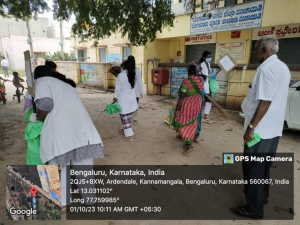
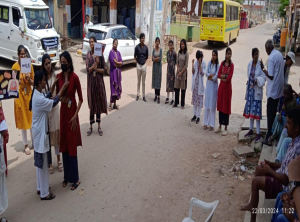
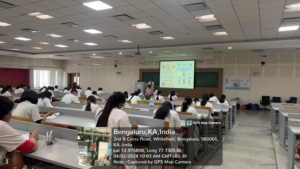
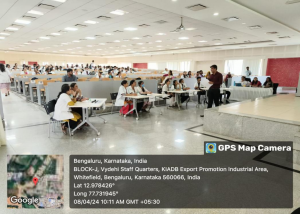
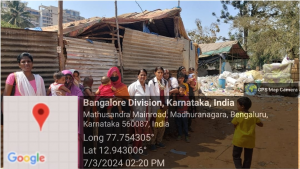
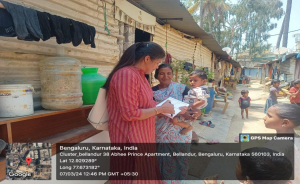
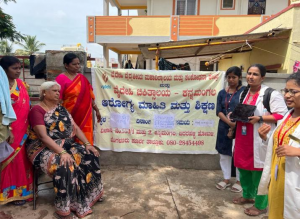
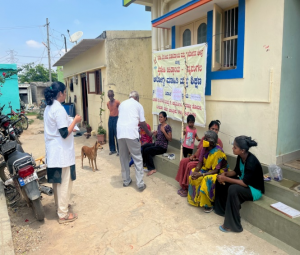
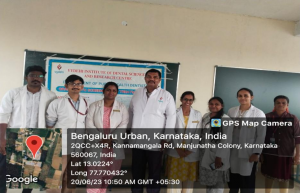
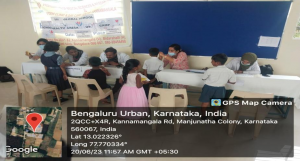
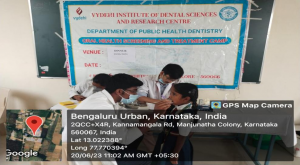
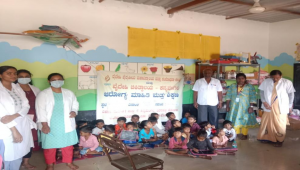
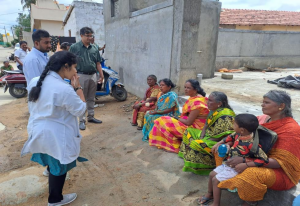
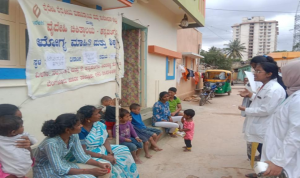
NON FUNDED (Post Graduates)
Kannamangala RHTC lab is Accreditated by National Accreditation Board for Testing and Calibration Laboratories (NABL)
